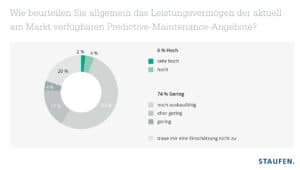
Predictive maintenance drives the industry like no other topic of digitization. Almost six out of ten companies now have experience with predictive maintenance. However, not even one in every ten companies rates the performance capability of current applications as high, and four out of ten companies also see a specific need for development. These are the results of the German Industry 4.0 Index, which was conducted for the fifth time. For the study, business consultancy Staufen together with experts from Staufen Digital Neonex surveyed around 450 industrial companies in Germany.
“Predictive maintenance still falls too short – across all industries,” says Martin Haas, CEO of Staufen AG as he sums up the central statement of the study. “And the fact that a good eight out of ten companies with predictive maintenance experience tend to rate the current results as positive is not a contradiction, but rather evidence of the low expectations currently being placed on the topic of predictive maintenance.”
Predictive maintenance, therefore, generally fulfils what is promised but at a very low overall level. “Intelligent software can, of course, recognize and report warning signs for errors, wear and tear and failures at an early stage,” says Staufen Board Member Haas. “But it is still the case that most failures are the result of human shortcomings and not of wear and tear. Only a very small portion of the service life of a machine is based on technical unavailability. This must not be ignored in the current hype about predictive maintenance. Only once users experience real added value will predictive maintenance be convincing in the long term.”
In addition, many companies already have extensive experience with wearing of their machines as well as appropriate on-site maintenance intervals, so that the current added value of predictive maintenance is likely to be far lower than is often claimed.
Nevertheless: Looking to the near future, 74 percent consider predictive maintenance to be an important topic for their own machinery, 65 percent also attach great importance to predictive maintenance as a service component for customer products. In mechanical engineering, on the other hand, the ratio is the other way around, with the focus being increasingly on generating sales with new services.
“In principle, predictive maintenance offers immense potential, especially for mechanical engineering. But to achieve real success with it, systems must be used that offer more than previous applications and also help reduce the proportion of human error. It would, for example, be conceivable to combine assistance programs for machine operators, which can reduce application errors, or solutions for simultaneous optimization based on machine data,” explains Johann Soder, COO, Managing Director of Operations at SEW-EURODRIVE GmbH & Co. KG.
The design of future concepts for modern condition monitoring and which smart products are imaginable in connection with predictive maintenance will be explained by the industry 4.0 pioneer at the Staufen AG Mechanical Engineering Congress on November 6 in Bruchsal. His company is the host of this year’s event, at which a large number of decision-makers from the mechanical and plant engineering sector in addition to the SEW Managing Director will present benchmark examples from their organizations.
More infromation: www.maschinenbaukongress.de
The 2018 German Industry 4.0 Index
For the 2018 German Industry 4.0 Index, business consultancy Staufen and Staufen Digital Neonex GmbH surveyed around 450 companies in Germany. The survey was conducted in mid-2018. A good two thirds of the companies surveyed come from the mechanical and plant engineering, electrical engineering and automotive industries. The study can be requested from: Kathrin Negele, kathrin.negele@staufen.ag
Press graphics on the topic of the 2018 German Industry 4.0 Index can be found in the download links below.



